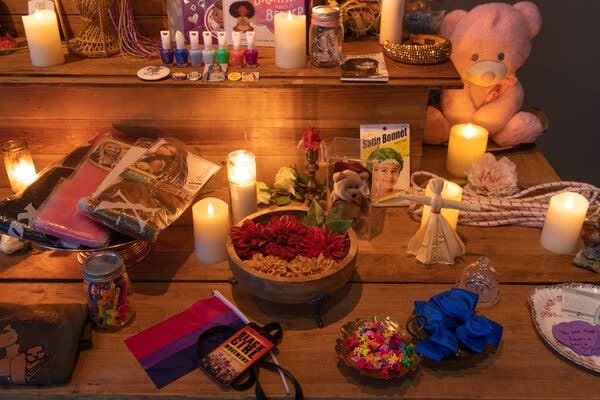Global Roundup: Kenya Sex Workers Call for Decriminalization, Chile Legalizes Same-Sex Marriage, The Black Girlhood Altar, Trans Activist Iman Le Caire, First Indian Miss Trans Global Pageant
Compiled by Samiha Hossain
Illustration: Inge Snip via Open Democracy
Sex workers in Kenya have reignited calls to decriminalize their work after new details emerge from the 2012 murder of sex worker Agnes Wanjiru. She was last seen with a white British soldier at a hotel in the town of Nanyuki, where the British army has a permanent base. Her body was discovered two months later in the hotel’s septic tank. It was reported in October this year that a British soldier had allegedly confessed at the time to the murder of Wanjiru. The Kenyan police announced that they were reopening the investigation into her murder with the support of the British government.
Local human rights organizations have long-complained about a lack of progress on Wanjiru’s case. Rose Wanyua Wanjiku, Wanjiru’s sister, says only this year has the family received requests from journalists for interviews.
While there are no laws that explicitly penalize sex work in Kenya, the country’s penal code, dating back from the colonial era, prohibits “living off the earnings of sex work” and “soliciting or importuning for immoral purposes”. Maryanne, a 36-year-old sex worker in Nanyuki, took part in a protest march in October demanding justice for Wanjiru. She believes that the current laws leave sex workers vulnerable to violence from Kenyan and foreign men.
These violent ones see themselves as superior and this is something that we also experience among the Black clientele. This job is not an accepted job. - Maryanne
Some have linked Wanjiru’s death and the decade-long lack of investigation to Britain’s colonial past in Kenya and the human rights violations by soldiers serving in the British Army Training Unit that has been set up in the country. Maxmilla Wamalwa, a 39-year-old sex worker, says that those committing violence against sex workers can get away with it by bribing police or paying off sex workers.
Sex workers in Kenya are pointing to serious systemic failures that are putting them at risk of violence. There is an urgent need for action to seek justice for Agnes Wanjiru and her family, and to create an environment where sex workers can work without fearing for their lives.
People raise their hands during a session of the Senate to approve a same-sex marriage bill in Valparaiso, Chile December 7, 2021. The book reads "Nicolas has two fathers". REUTERS/Rodrigo Garrido
Earlier this week, Chile joined more than 20 other nations that have legalized same-sex marriage. Lesbian and gay couples celebrate this milestone after decades of fighting. President Sebastian Pinera, who leaves office in March, is expected to sign the bill into law, which would then come into effect within 90 days.
Although civil unions have existed in Chile since 2015, it did not give same-sex couples all the benefits of married life. Under the new measure, gay couples can marry and adopt children. It can also provide them with additional welfare and state life insurance rights, among other benefits.
Minister of Social Development Karla Rubilar applauded Congress for taking "one more step forward in terms of justice, in terms of equality, recognizing that love is love." The vote also recognizes younger voters' growing support for equal rights.
Claudia Aravena, a 42-year-old teacher from the Chilean capital of Santiago, praises the vote saying it would give her family the same status as any other family in Chile. She will now get married in a ceremony with family and friends.
As a couple and parents of our daughter we weren't recognized. We were invisible. We did not exist...It's like not existing. We have all the same obligations in society but not the same rights...The law recognizes our right to equality and dignity - that we're not an invisible family. It means a lot. - Claudia Aravena
Javier Silva and Jaime Nazar, both 38, also praised how the legalization will offer new protections for the couple and their two children.
We were optimistic the law would change but we didn't know how quickly or when exactly...This means I can legally adopt my son, Clemente, and my partner can adopt Lola...This is a tremendous gift for Chile. We can now be recognized as a family. It's very exciting. - Javier Silva
“The Black Girlhood Altar,” a temporary monument, was assembled to honor the lives of Black girls cut short by violence.Credit...Nathan Keay/MCA Chicago via NYT
“The Black Girlhood Altar” is a temporary monument that has travelled through various neighborhoods in Chicago and is now at the Museum of Contemporary Art Chicago as part of an exhibition of work by the artist Andrea Bowers. It was meant to honour the countless Black women and girls whose deaths preceded the national reckoning that followed the murder of George Floyd. Last week, friends, family and supporters of Breonna Taylor, Latasha Harlins, Marcie Gerald, Lyniah Bell, Rekia Boyd and Ma’Khia Bryant gathered inside the gallery for a moment of collective mourning.
It’s taking trauma and reclaiming it for yourself and honoring the people in it. The horror is in the trauma, and the beauty is in the spirit of the person. - Scheherazade Tillet, a founder of A Long Walk Home, the national organization that sponsored the creation of the temporary monument
The two large wooden altars have steps adorned with offerings meant to honour the lives of Black girls, including satin hair bonnets, nail polish, a baby doll, children’s books, candles, teddy bears and bouquets of flowers. There was also a video of 16-year-old Ma’Khia Bryant doing her bouncy hair on TikTok playing on loop.
The friends and family also gathered for a private family-style dinner the evening before attending the exhibition. There, they were able to remember the lost lives and find healing together. At the end of the night, a microphone was passed around the room so that each attendee could share a wish for Black women. Their words echoed through the room like a benediction: “Protection.” “Freedom.” “Justice.” “Joy.”
ERICA LANSNER PHOTOGRAPHY via BBC
Iman Le Caire is a trans activist from Egypt currently living in the US, who has been helping many trans people around the world flee from persecution during the coronavirus pandemic. Iman is familiar with the stories of those she helps. She was assigned male at birth in a rural Egyptian village, but always knew inside she was a woman. She was abused for behaving in a feminine way and for having a “female demon” inside of her.
Before she transitioned, she was a choreographer and dancer at the Cairo Opera House – dancing was a way for her to combat her anxiety. While unable to acknowledge that she was transgender, Iman had a boyfriend and says that as a high-profile LGBTQ person, she was targeted relentlessly by the police on trumped-up charges. She applied for asylum in New York, fearing for her life.
A lot of LGBT people in Arab countries are currently in prison without anybody to help them. Many are abandoned by their families, can't find work and become homeless just because they are LGBT. Governments need to put laws in place to protect them. - Iman Le Caire
Initially, Iman wanted to keep a low profile in New York and concentrate on her job as a performance artist. However, the death of George Floyd in May 2020 and the Black Lives Matter protests led to a political awakening for her and reminded her of how she was treated back in Egypt.
And then suddenly the pandemic happened. I was so scared. I went out to protest and I found my healing, they were fighting for black lives and for trans lives. - Iman Le Caire
Pictures of Iman at the Brooklyn Liberation March, which saw 15,000 people gather in front of Brooklyn Museum to demand safety for Black transgender people, led to Ritaj contacting her and becoming her first case. Ritaj is a trans woman in Yemen who was "mentally and physically broken" after being sentenced to 100 lashes on homosexuality charges and imprisoned. Iman helped her start a new life in France. Since then, there have been many others, mainly from the Middle East but also from other at-risk countries, such as Jamaica.
Now, Iman has founded an organization, Trans Asylias, which helps persecuted transgender people apply for asylum. She is aware that despite some trans or non-binary people that are able to leave their country, a large number continue to live in fear of persecution or death. Her dream is to build a community where all trans and gender non-conforming people who have been treated horribly are safe and supported.
PHOTO: AKHIL IRIS PHOTOGRAPHY Via VICE
Sruthy Sithara has become the first Indian to ever win the Miss Trans Global title. Miss Trans Global is an international pageant for transgender women. This year, there were contestants from 16 countries.
After Sithara made history, she posted a dedication on Instagram to her mother who passed away in 2015, as well as her best friend Anannyah Kumari Alex who allegedly died by suicide in July, after months of pain, bleeding and disfigurement of her private parts after what she publicly called a “botched” gender confirmation surgery. Activists have called her death “institutional murder”.
Alex was my mentor, the closest friend and like a sister. She wanted me to represent India in the global trans queen pageant, and win it. - Sruthy Sithara
Sithara grew up experiencing gender dysphoria because of the prejudices she grew up with. She did not let the bullying and transphobia she often faced discourage her. Her friends played a role in helping her “successfully” come out to her family. After completing her studies, she was among the first trans people to receive a job in the government’s social justice department where she was able to work on projects that focused on the upliftment of transgender people.
Sithara made her modeling and acting debut in 2018 and has acted in local advertisements and music albums and wants to make it big in cinema. She talks about the issue in Bollywood of cisgender actors frequently playing trans roles.
What worries us is that trans women are still struggling in the industry, but all the trans roles are going to cisgender people. Acting is an art and I’m not debating that a cisgender person can’t play trans roles. But I expect that in the near future, transgender people are given cisgender roles, too. I’d love to play a cis girl’s character one day. - Sruthy Sithara
In the next few weeks, Sithara will be crowned in real life, as the pageant and announcement were completely virtual this year. She hopes to create awareness within her immediate circle regarding “medical negligence” and “mental health issues in trans and queer lives”, from which her friend Alex was direclty affected. Sithara wants to tackle prejudices and then work towards a better future for trans and LGBTQ people.
Samiha Hossain (she/her) is a student at the University of Ottawa. She has experience working with survivors of sexual violence in her community, as well as conducting research on gender-based violence. A lot of her time is spent learning about and critically engaging with intersectional feminism, transformative justice and disability justice.
Samiha firmly believes in the power of connecting with people and listening to their stories to create solidarity and heal as a community. She refuses to let anyone thwart her imagination when it comes to envisioning a radically different future full of care webs, nurturance and collective liberation.








